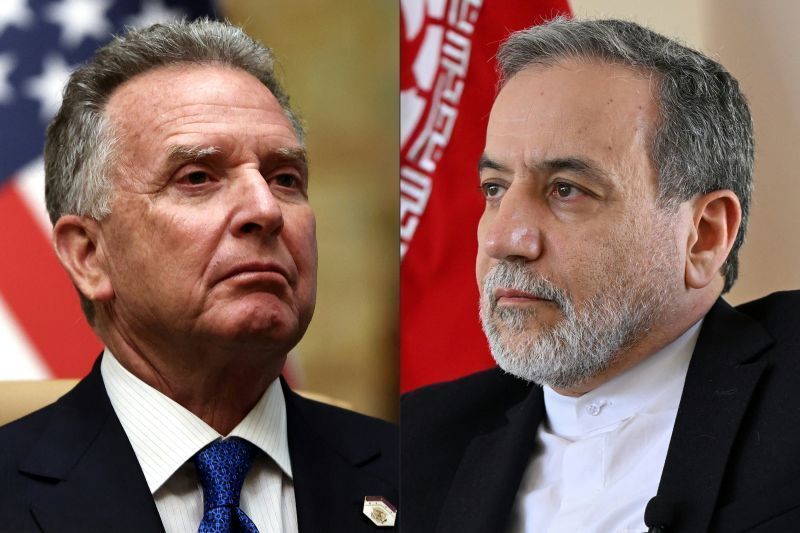- Home
- Middle East
- Iran Says 'Fundamental Differences' Remain With U.S. Ahead of Nuclear Talks

Steve Witkoff, envoyé spécial américain pour le Moyen-Orient, et Abbas Araghchi, ministre iranien des Affaires étrangères ©Anna Moneymaker / AFP
Iran warned it would hold the United States responsible if Israel attacks its nuclear facilities, but President Donald Trump's administration voiced optimism for a peaceful solution Thursday before new talks.
Trump spoke about his diplomacy on Iran with Israeli Prime Minister Benjamin Netanyahu, the White House said, in a telephone call largely focused on an attack in Washington that killed two Israeli embassy employees.
Israel has repeatedly threatened military action against arch-enemy Iran and CNN, citing unnamed US officials, reported Tuesday that Israel was making preparations to strike Iranian nuclear sites despite the ongoing US-Iran talks.
"We believe that in the event of any attack on the nuclear facilities of the Islamic Republic of Iran by the Zionist regime, the US government will also be involved and bear legal responsibility," Foreign Minister Abbas Araghchi said in a letter to the United Nations.
"Iran strongly warns against any adventurism by the Zionist regime and will respond decisively to any threat or unlawful act by this regime," Araghchi added.
The nuclear talks, which began on April 12, are the highest-level contact between the long-time foes since the United States in 2018 pulled out of a landmark deal between Iran and world powers, during Trump's first term in office.
The fifth round of talks, which are mediated by Oman, will take place Friday in Oman and include Steve Witkoff, Trump's globe-trotting negotiator.
Trump told Netanyahu that the Iran talks are "moving along in the right direction", White House Press Secretary Karoline Leavitt told reporters.
State Department spokeswoman Tammy Bruce said the United States would not be holding talks "if we didn't think that there was potential".
"I would say that clearly we believe that we are going to succeed," Bruce said.
'Fundamental differences'
But a key sticking point has been enrichment.
"There are still fundamental differences between us," Foreign Minister Abbas Araghchi said on state television, warning "we will not have an agreement at all" if the United States wants to prevent Iran from enriching uranium.
The 2015 deal with Iran, which was negotiated by former president Barack Obama, allowed Iran to enrich uranium at low levels solely for civilian energy.
The Islamic republic currently enriches uranium to 60 percent, far above the 3.67-percent limit set in the 2015 deal but below the 90 percent needed for a nuclear warhead.
Trump has vowed a deal tougher than Obama's.
"Iran cannot have an enrichment capability, because that ultimately makes them a threshold nuclear power," Secretary of State Marco Rubio told a congressional hearing Wednesday.
Iran is looking for relief from sweeping sanctions imposed in 2018 by Trump, which include penalties on all countries to prevent them from purchasing Iran's key export of petrol.
Rubio, questioned by a lawmaker, suggested the United States would maintain sanctions over Iran's development of ballistic missiles, a topic that was not addressed explicitly under the 2015 agreement.
"There are sanctions related to terrorism, sanctions related to their ballistic missiles programme, and the like. Those sanctions, if they're not part of the deal, they'll remain in place," he said.
'Devastating response'
Israel and Iran traded direct attacks last year for the first time, against the backdrop of soaring regional tensions triggered by the Gaza war, with Israel believing it has gained an upper hand.
On Thursday, Ali Mohammad Naini, the spokesman for Iran's Islamic Revolutionary Guard Corps, warned an Israeli attack would be met by a "devastating and decisive response in its small and vulnerable geography".
Also on Thursday, the Iranian army's ground forces unveiled three new drones, adding two reconnaissance and one kamikaze drone to to its arsenal, the official IRNA news agency reported.
Earlier in the day, a group of demonstrators gathered near the Fordo nuclear enrichment plant south of Tehran to voice support for the country's nuclear activities.
The crowd waved Iranian flags and chanted slogans such as "nuclear energy is our inalienable right" and "no compromise, no surrender, only confrontation with America".
By Payam Doost Mohammadi and Shaun Tandon, AFP
Read more



Comments